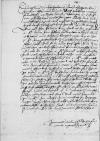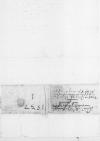 GStA, PK, HBA, C 2, No 85, 1 unnumbered
GStA, PK, HBA, C 2, No 85, 1 unnumbered
Durchlauchter(r), hochgeborner(r) furst, hochgeliebter(r), gunstiger(r) her(r) und freundt. / Noch erbittung meyner(r) fruntlichn, willigen dienst / wunsche ich E(wer) F(urstlichen) D(urchlauch)t ein glukseliges newjor(r) von Gote dem almechtigen(n) / und vil andere in götlicher(r) gnod(en), biss uff Methusalem ⌊Matusalem(m)Methusalem ⌋ zceite, zuvorann(n) etc.
Wie ich her komen(n) bin, / hab ich hie gefunden E(wer) D(urchlauch)t diner, den edlen(n) Felix von Allen (Felix von Alden, Feliks Mełdzyński, Felix Stang, Felix von Malden) (†ca. 1576), Prussian nobleman in the service of Duke Albrecht von Hohenzollern; 1529, 1530, 1533, 1536, 1538 ducal envoy to King Sigismund I Jagiellon and, in 1537, to the Crown Diet at Piotrków; 1545-1551(?) Vice-Voivode of Kulm (Chełmno); 1551 alderman of Kulm; 1551-1575 Sword-Bearer of Kulm (SZYMANIAK 1992, p. 55-56; Urzędnicy 5/2, p. 221)⌊Felix von Alden(n)Felix von Allen (Felix von Alden, Feliks Mełdzyński, Felix Stang, Felix von Malden) (†ca. 1576), Prussian nobleman in the service of Duke Albrecht von Hohenzollern; 1529, 1530, 1533, 1536, 1538 ducal envoy to King Sigismund I Jagiellon and, in 1537, to the Crown Diet at Piotrków; 1545-1551(?) Vice-Voivode of Kulm (Chełmno); 1551 alderman of Kulm; 1551-1575 Sword-Bearer of Kulm (SZYMANIAK 1992, p. 55-56; Urzędnicy 5/2, p. 221)⌋, / denn(n) ich gern(n) / aus solchem(m) langen(n) wege, / den er in E(wer) D(urchlauch)t dienst vorbrocht, / in gutter(r) gesuntheit gesehen hab. / Und so er aus Charles V of Habsburg (*1500 – †1558), ruler of the Burgundian territories (1506-1555), King of Spain as Charles I (1516-1556), King of Naples and Sicily, King of the Romans (1519-1530), Holy Roman Emperor of the German Nation (elected 1519, crowned 1530, abdicated 1556); son of Philip I the Handsome and Joanna the Mad of Castile⌊kay(serliche)r m(aieste)tCharles V of Habsburg (*1500 – †1558), ruler of the Burgundian territories (1506-1555), King of Spain as Charles I (1516-1556), King of Naples and Sicily, King of the Romans (1519-1530), Holy Roman Emperor of the German Nation (elected 1519, crowned 1530, abdicated 1556); son of Philip I the Handsome and Joanna the Mad of Castile⌋ hove so an mich von gutten(n) h(e)rn und frunden(n) vorschribenn(n) ist, / als der sich in E(wer) D(urchlauch)t dienst erlich, / fleissig / und wol gehalten(n), / hab ich in ane meyner(r) eigenen(n) hanth schreiben(n) an E(wer) D(urchlauch)t nicht mocht von mir lossen(n). / Dieweil ich ouch in frembden h(e)rn und freunden / von E(wer) D(urchlauch)t wegen / durch mein schreiben(n) befholen(n), / wil sichs wol czymen(n), in ouch E(wer) D(urchlauch)t zu befhelen(n), / nemlich so er noch seinem(m) vermugen(n) E(wer) D(urchlauch)t uffrichtig und getreulich / in sochen fernen wegen(n) / gedint, / bittend in solcher dienst wold lossen(n) genissen(n) / unn(n)d uff disse meine superinscribed in place of crossed-out unser⌈unser meine meine superinscribed in place of crossed-out unser⌉ vorschrifft / sein gnedig(e)r h(e)r wol sein(n), / das ich um(m)b E(wer) D(urchlauch)t alweg zuvorschulden(n) pflichtig wil sein(n) / und mich hie written over n⌈nee written over n⌉mit in E(wer) D(urchlauch)t, / die Goth der almechtig in langweriger gesuntheit und aller glukseligheit beware, / thu befhelen(n). /
 GStA, PK, HBA, C 2, No 85, 2 unnumbered
GStA, PK, HBA, C 2, No 85, 2 unnumbered  GStA, PK, HBA, C 2, No 85, 1 unnumbered
GStA, PK, HBA, C 2, No 85, 1 unnumbered 
